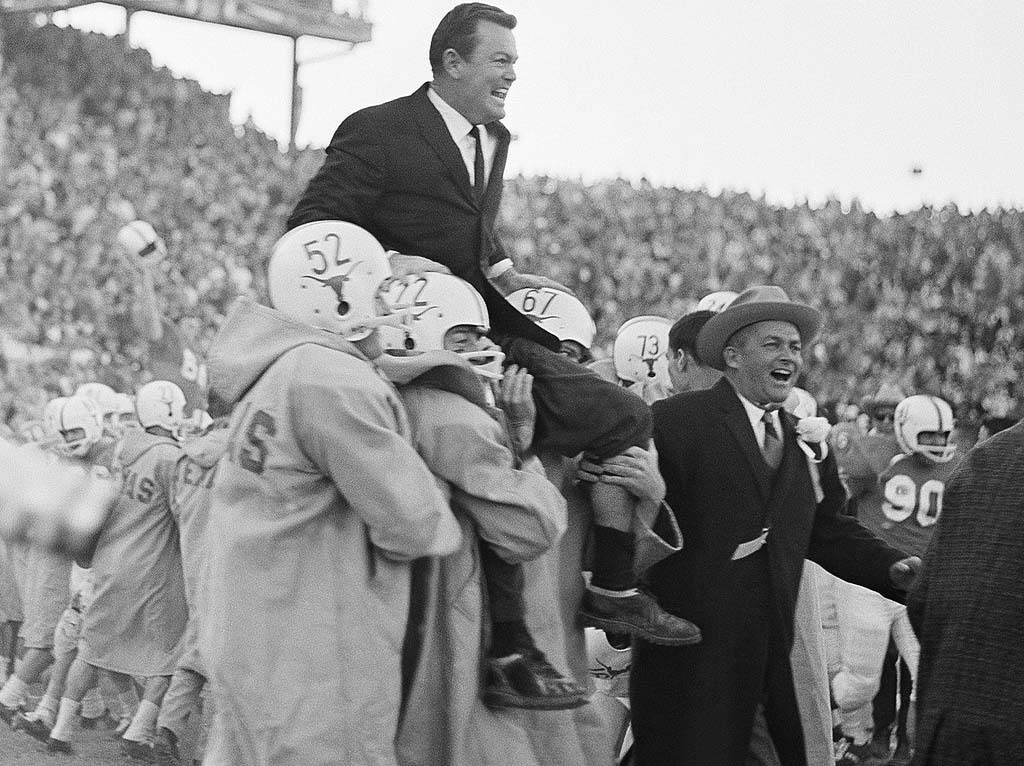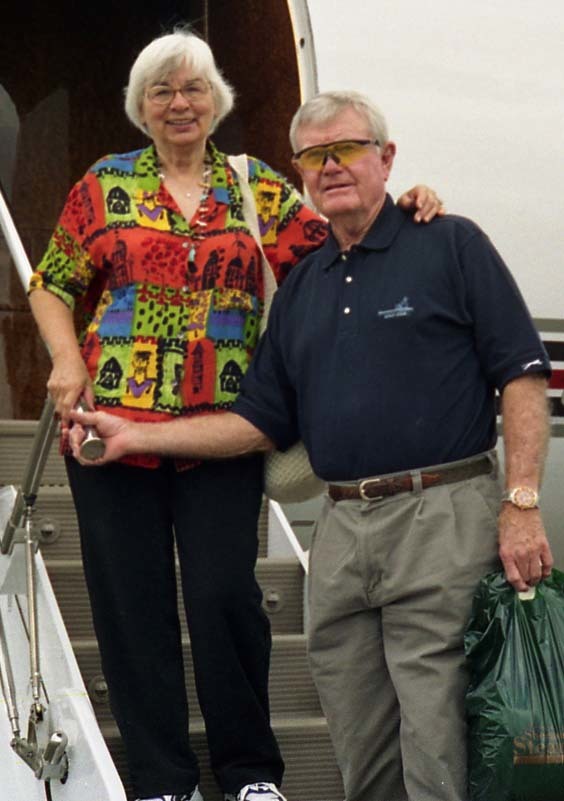Longhorn Legacy Will Shape the Future of Alzheimer’s Research and Care

Coach Darrell K Royal’s team hoists him in celebration. Photo courtesy of the DKR Research Fund
The Darrell K Royal Research Fund for Alzheimer’s Disease is advancing innovative research and whole-person care for patients and caregivers through a $250,000 gift to Dell Medical School at The University of Texas at Austin. Dell Med will also be a beneficiary of this year’s DKR Research Fund’s 4th& Goal Gala at ACL Live. The fund’s support pays tribute to the legacy of its namesake, Darrell K Royal, former football coach, UT athletic director and an enduring part of state lore.
Under Coach Royal’s leadership from 1957 through 1976, the Longhorns transformed into a powerhouse on the gridiron, winning three national championships, 11 Southwest Conference titles and a 167–47–5 record. The winningest coach in Longhorn football history, he never had a losing season.

Edith and Darrell K Royal. Photo courtesy of the DKR Research Fund
But his contributions to the community didn’t stop there. His “Pickin’ Parties” in the 1970s and longtime support of musicians and songwriters — including his friend Willie Nelson — helped spread enthusiasm for live music in Austin, now known as the live music capital of the world.
After Coach Royal was diagnosed with Alzheimer’s disease, his wife, Edith, and family friends founded the DKR Research Fund in hopes of helping others affected by the disease and one day finding a cure. The disease took his life in 2012.
“The sad fact is most everyone in our state is touched by this disease, and the Darrell Royal family is no exception,” Edith Royal says. “The DKR Research Fund represents a commitment to excellence in Alzheimer’s disease research and care for Texans, the nation and the world.”
With a vast network of supporters throughout the community, the DKR Research Fund, which raised $1 million last year, awards grants to promising research initiatives in Alzheimer’s and dementia, as well as programs supporting and educating caregivers.
“It’s an honor and a privilege to work with Mrs. Royal and help raise funds for neurological research in the state of Texas in Coach Royal’s name,” says Debbie Hanna, president of the DKR Research Fund. “This gift to Dell Med is a sound investment in promising research and meaningful care innovations that will create brighter futures for people with Alzheimer’s and their families.”
Improving care for patients & families
Alzheimer’s disease affects about 5.8 million people in the U.S., and experts estimate 500,000 more will be diagnosed each year. It is currently the sixth leading cause of death in the country, and Texas ranks third among states for the number of people living with Alzheimer’s disease — about 390,000.
Harnessing UT Austin’s research expertise across disciplines, Dell Medical School is poised to confront this debilitating condition. Clay Johnston, M.D., Ph.D., inaugural dean, 2014-2021, shares Coach Royal’s bold aspirations for the future of Alzheimer’s disease research and care.
“We envision Dell Med’s Mulva Clinic for the Neurosciences as a world-class center for the treatment and study of Alzheimer’s disease and other neurological conditions,” Johnston says. “By leveraging the strong research already underway at the university and adding in our strong focus on redesigning care around the needs and experiences of patients and their families, we can bring the most advanced care to our patients and improve their quality of life.”
Although an early diagnosis provides the best opportunity to slow the progression of Alzheimer’s disease, traditionally it can take up to 18 months and numerous visits with specialists before patients receive an accurate diagnosis. But the Mulva Clinic’s Comprehensive Memory Center aims to hasten that process significantly, bringing together a team of specialized care providers who work together on the patient’s case and see the patient during the same visit.
The center’s team of providers works with the patient and his or her family to create a written plan of care centered on the patient’s goals — and to surround caregivers and family with support. This approach minimizes the number of appointments and speeds up diagnosis and treatment. Additionally, it lessens the burden on patients’ caregivers and families.
“The written care plan is like a road map to help guide families with next steps, such as research opportunities, brain health strategies and programs in the community,” says social worker and center manager Alyssa Aguirre.
The clinic also offers counseling and education services for the patient and caregivers on topics such as disease progression, managing behaviors, communication strategies and change in family roles.
Dell Med’s chair of neurology, Dr. David Paydarfar, says this new model of care helps people living with Alzheimer’s stay healthy at home.
“We want to help people with Alzheimer’s disease and dementia keep doing the things they love and be able to live independently for as long as possible,” Paydarfar says.
This is a distinguishing feature of the center and core to Dell Med’s mission of improving health by providing value-based care.
And it’s working. The Texas Health and Human Services commission recently recognized the Mulva Clinic’s Comprehensive Memory Center with the inaugural Innovators in Aging Award, given to agencies and creative programs that improve the quality of life for older adults in Texas.
“This is more than a ‘come-in-and-see-your-doctor’ experience,” Paydarfar says. “Our interdisciplinary care teams create a cohesive plan to improve the lives of patients — and their families.”
If Alzheimer’s disease has affected you or a loved one, we can help. Visit the Comprehensive Memory Center’s webpage for more information. If you would like to support Dell Med and UT Health Austin’s work to improve care for Alzheimer’s disease and dementia, contact the development team.
Published August 2019